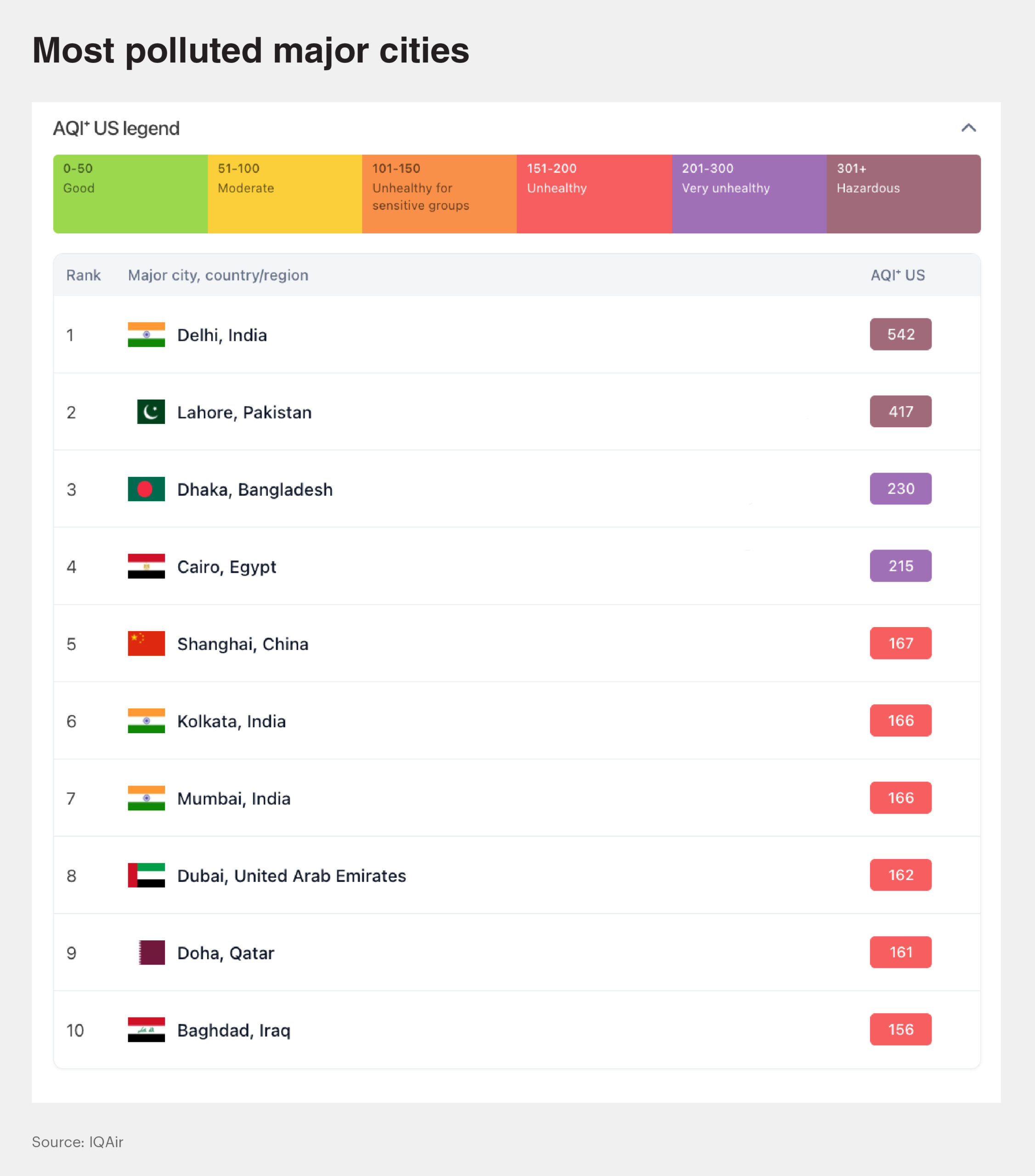Indian capital Delhi has overtaken Pakistan’s Lahore as the world’s most polluted city. The concentration of PM2.5 particles was more than 120 times the World Health Organisation’s recommendation. In some parts of Delhi this week, pollution levels exceeded 1,750 on the Air Quality Index, according to IQAir, a Swiss company which tracks global air quality. A reading above 300 is considered hazardous to health. Delhi and Lahore are the only two cities in the world to rank in the top pollution level of “hazardous”.
In neighbouring Pakistan, worsening air pollution sickened an estimated 1.8 million people in the eastern Punjab province in the past month. The province banned outdoor activities, closed schools and ordered some shops, markets, and malls to close early. The concentration of PM2.5 means particulate matter measuring 2.5 microns or less in diameter that can be carried into lungs, causing deadly diseases and cardiac issues.
The problem of polluted air in Delhi has led to the establishment of a first-ever clinic dedicated to pollution-related illnesses. The specialist clinic at Delhi’s Ram Manohar Lohiya (RML) hospital was set up last year to treat the growing number of patients affected by hazardous air pollution, which worsens every winter in the Indian capital. It’s become so bad that Delhi’s Chief Minister Atishi declared a “medical emergency” as authorities closed schools and urged people to stay home. India’s pollution authority said several parts of Delhi had “severe+” air quality and implemented emergency measures to relieve the smog, including halting non-essential truck movement and construction work. Officials also sprinkled roads with water and dust suppressants, and ramping up road sweeping.
But experts say these efforts, which are rolled out every year, are merely temporary measures that don’t tackle the underlying causes of air pollution. They point to the example of China, which with a decade of effort to combat air pollution, has gone from the top of world’s worst pollution list down to a current ranking of 27 on the ranking by IQAir. In 2013, China’s government started to invest billions of dollars into a national air pollution action plan. What followed was a rollout of new regulations, including restricting the number of vehicles on the roads in major cities, tightening environmental oversight and controls on emissions, building a nationwide system of air monitoring stations, and reining in coal and other heavy-polluting industries.
Beijing, said Frank Christian Hammes, Global CEO of IQAir, “took it seriously.” “We see electrification. In restaurants, and on street food vendors, we don’t see coal being used anymore. The power generators have shifted to gas. All this has made a big difference,” he said.

India’s Oil Minister, Hardeep Singh Puri, said the world’s No 3 oil importer and consumer is expected to rely on fossil fuels until at least 2040. While global refining centres are downsizing as energy transition progresses at an unpredictable pace, India’s rising daily crude utilisation means it continues to rely on fossil fuels, and it is also building coal fired power stations. India is the world’s third-largest emitter of greenhouse gases, behind China and the US, and has pledged to achieve a net zero carbon emission target by 2070.
Back at COP29, the president of host country Azerbaijan, Ilham Aliyev, told the UN climate conference that oil and gas are a “gift of God”, saying nations “should not be blamed” for having fossil fuel reserves.
“Oil, gas, wind, sun, gold, silver, copper, all… are natural resources and countries should not be blamed for having them, and should not be blamed for bringing these resources to the market, because the market needs them,” Aliyev said.
Azerbaijan plans to expand gas production by up to a third over the next decade. UN chief António Guterres countered by telling the conference that doubling down on the use of fossil fuels was “absurd”, adding that the “clean energy revolution” had arrived and that no government could stop it.
“The sound you hear is the ticking clock,” Guterres said. “We are in the final countdown to limit global temperature rise to 1.5 degrees Celsius and time is not on our side.”
He called 2024 a “masterclass in climate destruction” with disasters being “supercharged by human-made climate change”.
“The sound you hear is the ticking clock. We are in the final countdown to limit global temperature rise to 1.5 degrees Celsius and time is not on our side.” – UN Secretary General António Guterres
The UN’s World Meteorological Organization previously said that 2024 is on track to be the world’s warmest year on record. Against this backdrop, G20 leaders meeting in Rio agreed that COP29 negotiators need to reach a deal on a new financial goal for how much money rich nations must provide to poorer developing nations in climate finance.
Economists suggest that goal should be at least $1 trillion annually. Most of the world’s climate-friendly spending so far has been skewed towards major economies such as China and the United States. Africa’s 54 countries received just 2% of global renewable energy investments over the last two decades.
And at last year’s COP28, climate vulnerable countries insisted that the goals must be paired with a deal among countries to phase out the world’s use of fossil fuels.
“It is only half the solution. The pledge can’t greenwash countries that are simultaneously expanding fossil fuel production,” said Tina Stege, Climate Envoy for the Marshall Islands.